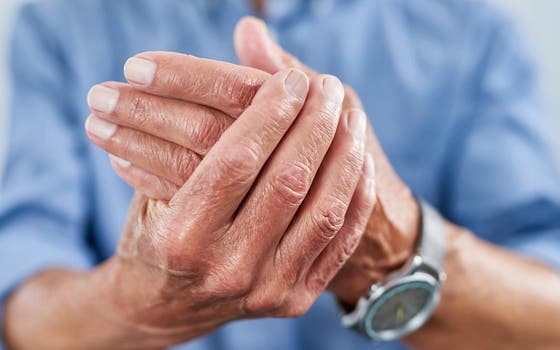Apr 23: Existing drugs now available in study for patients with rare immune diseases

This month the first study within the DRIMID consortium (DRIMID stands for Drug Rediscovery for Rare Immune Mediated Inflammatory Diseases) has started. This study will investigate the efficacy and safety of the drug filgotinib (approved for treatment of rheumatoid arthritis and ulcerative colitis) in three rare immune diseases (Behçet's disease, idiopathic inflammatory myopathie, IgG4-related disease). DRIMID aims to investigate whether this drug - despite the absence of formal drug approval - can also be used to treat these rare immune diseases.
New drugs are usually developed (and therefore faster accessible) for conditions involving large patient groups. However, for rare diseases, drug development is more difficult. With the establishment of the DRIMID partnership, major steps have now been taken to make new drugs available to such patient groups. The project is a collaboration between ARCH foundation, ReumaNederland, drug company AlfaSigma and a number of Dutch hospitals with the aim of (re)developing drugs for rare disorders.
Rare immune diseases
Rare immune-mediated inflammatory diseases usually have an unknown cause, and are often associated with the formation of autoantibodies (the immune system attacks its own body). Examples of such diseases include granulomatosis with polyangiitis, myositis, vasculitis of the great vessels, IgG4-related disease, Behçet's disease, Sjögren's disease and systemic sclerosis. A major problem in clinical practice is that many patients do not respond adequately to common anti-inflammatory drugs over time. Thus, there is an unmet medical need for adequate treatment options for this group.
The study
The aim of the study is to investigate if filgotinib is efficacious when used by patients with rare immune diseases and whether the drug is well tolerated. Now that the first study within the DRIMID framework has been approved by the medical ethics review committee, patients are being sought with one of the following rare immune diseases:
- Behçet's disease
- idiopathic inflammatory myopathie
- IgG4-related disease
It is important that participants have active symptoms of the disease at the start of the study. In addition, it is important that they have first tried regular treatment methods, such as prednisone and at least one other anti-inflammatory agent. If the disease did not or insufficiently respond to these drugs, or if the patient was hypersensitive to these drugs, the patient may be eligible for this new study.
The study will follow up patients for 26 weeks. At several points during the study, the effect of the drug on symptoms will be measured by a physician via physical examination, blood tests and questionnaires. If the drug appears to be working well for the patient at the end of the study, the patient will be allowed to continue taking it. Participation in the study is free of charge.
Participating hospitals
The study, coordinated by rheumatologist Prof. Jaap van Laar MD PhD (Department of Rheumatology & Clinical Immunology, UMC Utrecht), will start in six Dutch hospitals. Patients can be approached by their physician to participate, but they can also inquire about eligibility themselves. They can do so by sending an e-mail to reumatologie-research@umcutrecht.nl. The research nurse at UMC Utrecht will then contact the hospital most suitable for the patient. The study will be conducted at the following locations:
- UMC Utrecht
- Amsterdam UMC
- Erasmus MC (Rotterdam)
- Radboudumc (Nijmegen)
- Haga Hospital (The Hague)
- Zuyderland Medical Center (Heerlen)
DRIMID consortium
DRIMID is an acronym and stands for ‘Drug Rediscovery for Rare Immune Mediated Inflammatory Diseases’. ARCH (Arthritis Research and Collaboration Hub, a Dutch medical expertise platform for rare autoimmune diseases), ReumaNederland and UMC Utrecht (the first academic partner within DRIMID) established the public-private DRIMID consortium in 2021. The consortium is funded by ReumaNederland and Health Holland. In time, the investigators within the consortium intend to expand the project to other immune diseases and also to other drug companies and drugs.
Can I participate in this study?
Only patients between the ages of 18 and 65 years who have an active form of Behçet's disease, idiopathic inflammatory myopathy or IgG4-related disease can participate in the study. In addition, it is important that participants have first tried regular treatment methods, such as prednisone and at least one other anti-inflammatory drug. If the disease did not respond to these or insufficiently, or if the patient was hypersensitive to these drugs, the patient may be eligible for this new study. Patients can be approached by their doctor to participate, or they can inquire about eligibility themselves. This can be done by sending an e-mail to reumatologie-research@umcutrecht.nl.

